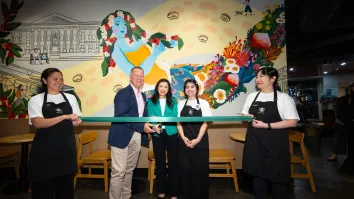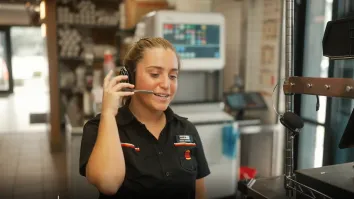
Sharetea remains focused on brick and mortar growth amidst industry's digital acceleration
The Taiwanese bubble tea brand talks to QSR Media for the first time through chief executive Chris Mavris.
When pandemic-induced restrictions were about to hit the country earlier this year, Chris Mavris approached it with the aim of retaining some sort of regularity for Sharetea, its franchise partners and team members.
“Our founder still has family that lives in China...so I was a little bit more informed about what was going on than some of my counterparts that work for brands that weren't exposed,” he explained to QSR Media in an exclusive interview.
Over 90% of the Taiwanese bubble tea brand’s 50-plus stores were able to keep trading via delivery and takeaway when closures started, with Mavris choosing to echo the Prime Minister’s call for permitted businesses to remain open, including theirs. Affected outlets were those located in CBDs and universities.
“I use that sort of language in all my communications to our franchise partners, which the area coaches then picked up and they continued that communication,” he said. “Yes, sales were terrible. However, we did try to keep some sort of normality.”
“Unless people had underlying health issues, then we told them not to go to work. But based on the fact that we're a very young, focused brand and most of our team members are young, all the communications at that stage were saying that people under 18 or under 20 didn't have much to fear,” he added.
Around the third week of March, the brand decided to waive royalty and marketing fees for their franchise partners for the rest of that month. In the following April, Sharetea then halved the cumulative rate for both fees.
“These are unprecedented times, and it calls for some outside the box thinking and I've always been one of those people that thinks outside the box and tries to find commercial solutions a little bit different than most others do. In my heart of hearts, I believe that was the right thing to do for our partners.”
A review of Sharetea is also in the pipeline, with them looking to get “better pricing” in order to “pass that back” to their franchisees.
“Food and beverage will always be bricks and mortar”
Mavris said the QSR industry should be lauded for adapting “really well and really quickly”, with Sharetea joining a long list of brands that increased sales through third-party delivery platforms.
“Yes, the impact of the commissions that they take is significant. However, we saw our aggregator sales double for that period from where it normally sits,” he said, also lauding restaurant brands that are finding a way to keep staff employed.
“Most of the businesses don't or won't make money during this period, it was more about supporting the team members and keeping that connection to the brand that is really important. To train a whole new set of team members is challenging so it's great that we're able, on many levels, to keep those team members close to us.”
Despite growth in digital sales, Mavris rejected the idea of exploring smaller footprints and cloud kitchens, saying that they look to grow the business through a traditional brick and mortar approach.
“We are an experienced brand. You come into the store, you see the bright colors, the blues, the yellows, the pinks, the pastels. you interact with the people behind the counter retail. A long time ago, retail was explained to me by a mentor of mine. And he said, ‘Chris, as a retailer, you're on a stage every day, and you're performing for people.’ And that's the way I view retail,” he explained.
“It's not on the end of an app with the food brought to you. It's about the experience engaging with the person making the drink, talking to them, chatting with them, watching them and talking to the people around you and taking in the environment. And that enhances the flavor of any product.”
Mavris confirmed the chain will start rolling out stores this month, part of a larger plan to open 10 to 12 stores by this year.
“I believe that food and beverage will always be bricks and mortar and after we come out of this pandemic, I believe people are gonna enjoy being out again,” he said.
This strategy, Mavris said, coincides with his plan to bring Sharetea “into the 21st century” in the next six to nine months.
“We're looking at new POS systems. We're looking at a back-of-house, our own portal. Ordering system rewards will come probably later in the year if not early next year. We have really been a little bit disjointed,” he explained. “We're looking to get all our aggregators talking to our point of sale rather than separate units all over the place. We are going to be looking at our website later in the year to really enhance that customer experience, both offline as well as online.”
Demystifying the product
For their marketing push, Mavris teased “a few different ideas floating around” for next year, part of a larger approach to reach out to more ethnicities. 50-60% of persons of Asian descent make up Sharetea’s customer base.
“If I can drink our product and enjoy it - I'm an old white man - then anyone can drink it and enjoy it. The big thing for me is gonna be focusing on education. So educating people to understand what the product actually is,” he said. “Our main competitor is Chatime and I take my hat off to them. They have done a good job in really demystifying the product. But I think the more we can demystify it to old white people like me, sales will continue to grow. People ask me, ‘What do you do’ And I say ‘Sharetea.’ They say, ‘What's that?’ The easiest way I find to describe our industry is Asian ‘Boost Juice’.”
Tougher retail environment ahead
Mavris encouraged both tenants and landlords to act in good faith in rent negotiations during this time.
“I've had enough conversations and I know enough of them to understand that they need to protect the value of their properties and the future and the value for their shareholders. And they also need to, but they've also got to be very mindful that if they push too hard that they're not gonna have any tenants in there. So this is real delicate,” he said.
Mavris also expects a tougher retail environment in the first quarter of next year, due to government stimulus packages ending later this year, the decline of tourism and less spending circulating within the economy.
“In my opinion, at the moment, Australia is living on government handouts, business, and the community is living on government handouts [...] so I think the industry will hold on until December. That next January, February, March, I think all the retail industry, not only food, is in for a big surprise and I think we're going to see a lot of people not reopen after those periods,” he surmised.
“There's going to be a lot of consolidation and I think the industry will shrink as far as number of outlets will go, especially in the CBD locations of the major cities where office employees have not been going back to work yet. As much as the government is priming the economy with injecting capital into the economy, I think the early part of the year is going to be very tough and only the fittest will survive.” ###

























